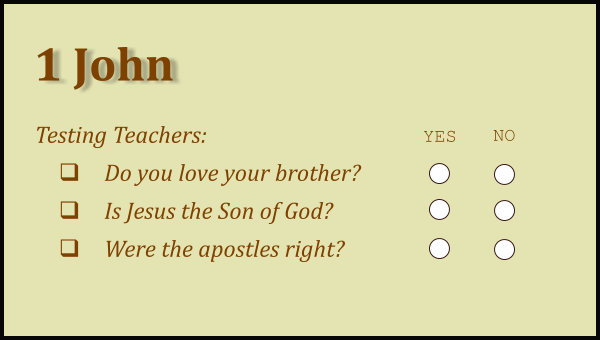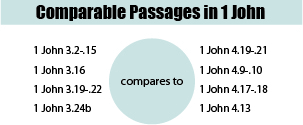By Tyson Thorne

In this section of John’s epistle, he wants to make sure his point is not lost on his readers. At the end of verse 10, John states how one must love his brother if he is to be identified with Christ. Now in verse 11 he will state it positively, and this phrase he will use four more times in the book: “Love one another.” Look again to verse seven of chapter four, and you will find once more, “Love one another, for love comes from God.” Yet again, in verse 11, “Dear friends, since God so loved us, we ought to love one another.” In the very next verse, verse 12, he tells us once more what this action proves: “…if we love one another, God lives in us and God’ love is made complete in us.”
In this passage, what do you think John’s Big Idea is? Hmm…
There are many more duplicate injunctions in this passage listed below:
These duplications are hardly accidental, and in fact point to a unique structure. Notice how most of 3.10b to the end of that chapter duplicates 4.7 to the end of its chapter. Now, what passage is being showcased in this context? Obviously 4.1-.6! While loving ones brother is the second greatest commandment for a believer, it is also a handy tool for testing the spirit by which a teacher comes. If a teacher does not love his brother, then he cannot be from God.
John takes a minor time-out from the topic of love to explain in greater detail how to identify the spirit of a teacher. The first and most important test, of course, is love. But there are more empirical methods than this, and John points to the teacher’s testimony regarding Christ as a case in point. Simply put, if the teacher does not believe Jesus is the Christ (Messiah), then he is automatically a servant of the Antichrist. However, warns John, don’t stop there. Test the teacher regarding the things you have heard from the apostles themselves. It is well known that the apostles are from God, and any other teacher from God will also agree with the apostolic teachings.
Interestingly, John makes three distinct division among people in verses four through six. The “you” of verse four regards the readers of the letter, and states that they are indwelled by God and will continually overcome the spirit of the Antichrist as a result. The “they” of verse five refers to the false teachers (antichrists) and state that they will always be listened to by the world at large because they are from the world (diplomats of the world). Finally, the “we” of verse six refers to the apostles as a whole, stating that they are from God (diplomats of God) and will be listened to by those who also are from God.
Back to love. John loved his readers so much that he desired to give them knowledge that would protect them from the spirit of the Antichrist. Knowledge is an important ingredient of abiding in Christ, but not nearly so important as love and faith. For this reason, he returns to the issue of love with ever-increasing verve. John’s love is proven not to simply be the kind of love that satisfies for the moment, but the kind of love that works to prove itself over the life of the readers. John tells us that love is more than a momentary feeling, it is abiding in Christ, and continuing perseverance for your brother. Love one another.
|
|
